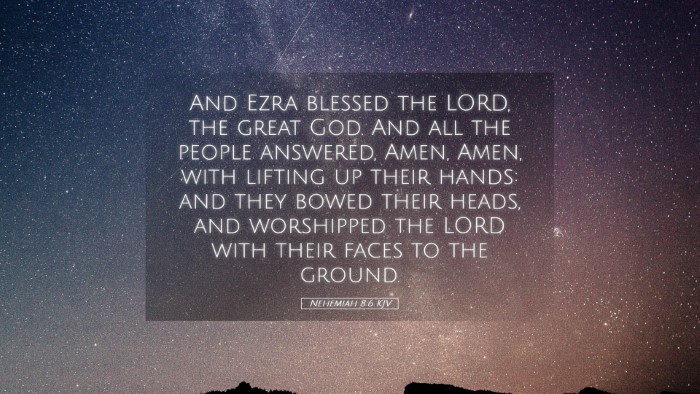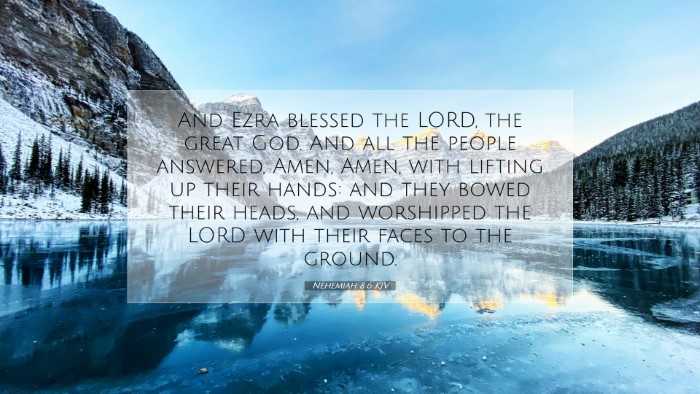Old Testament
Genesis Exodus Leviticus Numbers Deuteronomy Joshua Judges Ruth 1 Samuel 2 Samuel 1 Kings 2 Kings 1 Chronicles 2 Chronicles Ezra Nehemiah Esther Job Psalms Proverbs Ecclesiastes Song of Solomon Isaiah Jeremiah Lamentations Ezekiel Daniel Hosea Joel Amos Obadiah Jonah Micah Nahum Habakkuk Zephaniah Haggai Zechariah MalachiNehemiah 8:6
Nehemiah 8:6 KJV
And Ezra blessed the LORD, the great God. And all the people answered, Amen, Amen, with lifting up their hands: and they bowed their heads, and worshipped the LORD with their faces to the ground.
Nehemiah 8:6 Bible Commentary
Commentary on Nehemiah 8:6
Verse: "And Ezra blessed the LORD, the great God. And all the people answered, Amen, Amen, with lifting up their hands: and they bowed their heads, and worshipped the LORD with their faces to the ground."
Introduction
This pivotal verse marks a significant moment in the history of the Jewish people as they return to Jerusalem and reestablish their covenant relationship with God after their Babylonian exile. It encapsulates the reverence and communal worship of the people as they respond to the reading of the Law.
Contextual Background
The Book of Nehemiah depicts the restoration of Jerusalem under the leadership of Nehemiah. By chapter 8, we witness the assembly of the people to hear the Word of God. Ezra, a scribe and priest, plays a crucial role in this spiritual revival, leading the people in the public reading of the Law.
Insights from Commentaries
Matthew Henry's Commentary
Henry emphasizes the public declaration of God's Word as the foundation of the assembly's worship. He highlights Ezra's role in blessing the LORD, which is indicative of recognizing God's sovereignty and majesty. Henry elaborates on the communal aspect of the response when the people shouted "Amen, Amen," demonstrating their agreement and commitment to the truths conveyed in the Law.
Moreover, Henry points out that the lifting of hands symbolizes surrender and worship, and bowing the heads indicates humility before God. This posture of worship underscores the reverence the people have for God's Word and their desire to align their lives with it.
Albert Barnes' Notes on the Bible
Barnes explores the significance of Ezra blessing the LORD, noting this act was an invocation of gratitude and recognition of God’s greatness. He discusses how the people's response, "Amen," reflects a deep-seated feeling of reverence and community acknowledgment of God's truth. This answer to Ezra's blessing serves as an affirmation of their faith and unity as a people of God.
Barnes also draws attention to the physical gestures of the people—lifting their hands and bowing—indicating an embodiment of worship that engages both the spirit and the body. Such expressions serve as a reminder of the holistic nature of worship that involves every aspect of the believer's existence.
Adam Clarke's Commentary
Clarke notes the significance of Ezra’s role as a leader in spiritual matters following the exile. He elaborates on how the people's collective response to the Law showcases a newfound commitment to living according to God’s commands. Clarke emphasizes that the lifting of hands signifies prayer and reaching out towards God, while bowing down expresses submission and reverence.
Clarke further reflects on the cultural implications, suggesting that such expressions of worship could serve as a model for contemporary church practices. His insights encourage modern readers to consider how they physically demonstrate their worship in a communal setting.
Theological Implications
This verse serves as an important reminder of the significance of communal worship and the reading of Scripture in the life of the Church. The people’s enthusiastic response to God's Word underscores the need for engagement with Scripture in a way that evokes a profound spiritual and communal response.
The act of blessing the Lord and the responses of the people create a powerful image of worship that informs the theology of liturgy and corporate worship. Pastors and church leaders are encouraged to develop worship services that invite genuine responses from congregants, reflecting the communal nature of faith.
Application for Today
The principles evident in Nehemiah 8:6 can be pivotal for today’s church leaders and congregations:
- Public Reading of Scripture: Emphasizing the importance of the reading of God’s Word in worship services.
- Community Response: Encouraging congregants to actively participate in affirming God’s Word through responses such as “Amen”.
- Embodiment in Worship: Recognizing that physical expressions of worship (hands raised, bowing) enhance spiritual engagement.
- Teaching and Leadership: Leaders should effectively communicate God’s Word and its relevance to the lives of believers.
Conclusion
Nehemiah 8:6 is more than a historical recounting of the Jewish people’s worship; it is a profound illustration of how communal engagement with God’s Word can lead to a powerful expression of faith. As pastors, students, theologians, and scholars engage with this text, they can draw from its timeless insights into worship, community, and the importance of God’s Word in both personal and collective contexts.


